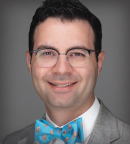Julio Chavez, MD, of the Department of Malignant Hematology, Moffitt Cancer Center, Tampa, Florida, was cautiously enthusiastic about these findings in CD30-positive lymphoma.
“This clinical trial is novel, as it engages cord blood derived-NK cells to attack CD30-positive tumor cells using a bispecific antibody (AFM13). The real novelty is that this antibody was linked to cord blood CD16-positive NK cells prior to its infusion in order to augment its immune effects against CD30-positive lymphomas. The clinical relevance of this trial is the high response rate, with 17 of 19 patients responding [at all dose levels]. At the recommended phase II dose, the response rate was 100%. The other important aspect was the toxicity profile, as the therapy did not result in cytokine-release syndrome and/or neurotoxicity, as seen with available CAR [chimeric antigen receptor] T-cell therapy,” Dr. Chavez commented.
“This therapy seems very promising, but it is still early to conclude whether it will replace other available cell therapies such as CAR T-cell therapy. Although response rates are remarkable, we need to know the durability of these responses. This is a phase I clinical trial, and we need expansion and confirmatory phase II dosing. The sample size is small, and we will need long-term follow-up. CAR T-cell therapy remains the standard of care for specific types of lymphoma such as large cell lymphoma and follicular lymphoma. However, the results are encouraging, and this could be a treatment option for CD30-positive lymphoma, such as T-cell lymphomas and Hodgkin lymphomas,” Dr. Chavez stated.
Additional Commentary
Hayder Saeed, MD, of the Department of Malignant Hematology, Moffitt Cancer Center, Tampa, Florida, also weighed in on this abstract. “This is a great study to enhance the immunotherapy and cellular therapy work being done in CD30-positive lymphoma, such as Hodgkin and T-cell lymphomas. The response to the full phase II dose was impressive and addresses a difficult-to-treat patient population with limited treatment options once they relapse after front-line therapy,” Dr. Saeed noted.

Hayder Saeed, MD
“Other cellular therapy approaches are being developed in this space using CD30-positive chimeric antigen receptor T cells. They also have showed promising responses but are still in development and not approved by the U.S. Food and Drug Administration for this indication,” he continued.
“This approach using bispecific antibodies to enhance the activity of NK cells is unique. It is also impressive to see the safety profile in this early study, and I would like to see how this pans out as more patients are enrolled. It would be interesting to see these results confirmed or replicated in a larger multicenter trial to validate these single-center findings,” Dr. Saeed concluded.
DISCLOSURE: Dr. Chavez has served on advisory boards for Kite/Gilead and Novartis. Dr. Saeed reported no conflicts of interest.

